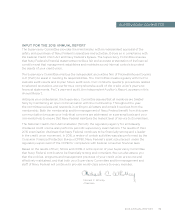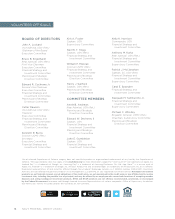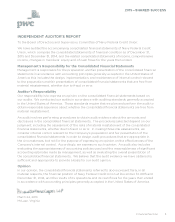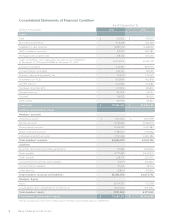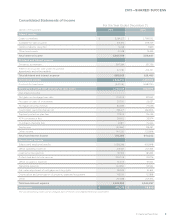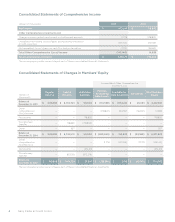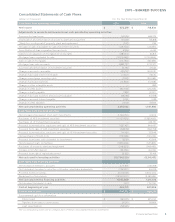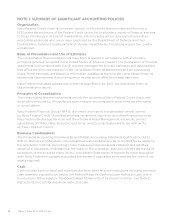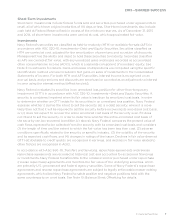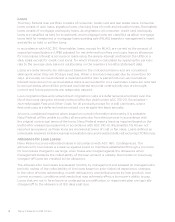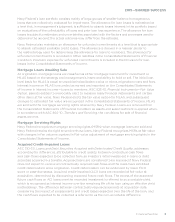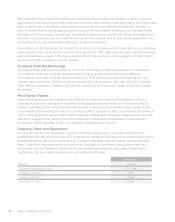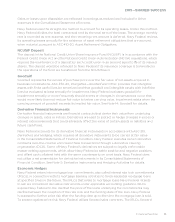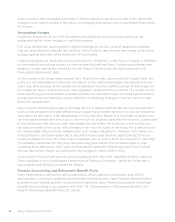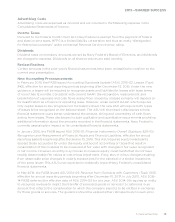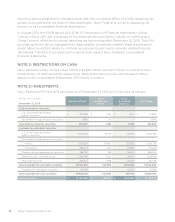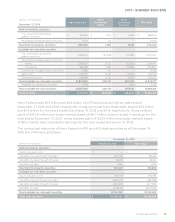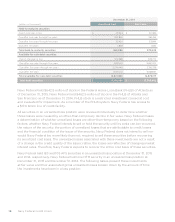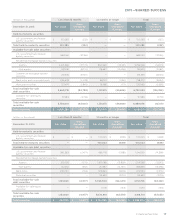Navy Federal Credit Union 2015 Annual Report Download - page 26
Download and view the complete annual report
Please find page 26 of the 2015 Navy Federal Credit Union annual report below. You can navigate through the pages in the report by either clicking on the pages listed below, or by using the keyword search tool below to find specific information within the annual report.Financial Section 7
2015—SHARED SUCCESS
Short-Term Investments
Short-term investments include federal funds sold and securities purchased under agreements to
resell, all of which have original maturities of 90 days or less. Short-term investments also include
cash held at Federal Reserve Bank in excess of the minimum reserves. As of December 31, 2015
and 2014, all short-term investments were carried at cost, which approximated fair value.
Investments
Navy Federal’s securities are classified as held-to-maturity (HTM) or available-for-sale (AFS) in
accordance with ASC 320-10, Investments—Debt and Equity Securities. Securities classified as
HTM are carried at cost, adjusted for the amortization of premiums and accretion of discounts.
Management has the ability and intent to hold these securities to maturity. Securities classified
as AFS are carried at fair value, with any unrealized gains and losses recorded as accumulated
other comprehensive income (AOCI), which is a separate component of members’ equity. See
Note 3: Investments for details. Gains and losses on dispositions are computed using the specific
identification method and are included in Net gains on sales of investments in the Consolidated
Statements of Income. For both HTM and AFS securities, interest income is recognized on an
accrual basis, and premiums and discounts are amortized or accreted as an adjustment to interest
income using the interest method (eective yield).
Navy Federal evaluates its securities in an unrealized loss position for other-than-temporary
impairment (OTTI) in accordance with ASC 320-10, Investments—Debt and Equity Securities. A
security is considered impaired when its fair value is less than its amortized cost basis. In order
to determine whether an OTTI exists for its securities in an unrealized loss position, Navy Federal
assesses whether it (a) has the intent to sell the security, (b) is a debt security, where it is more
likely than not that it will be required to sell the security before recovering its amortized cost basis,
or (c) does not expect to recover the entire amortized cost basis of the security even if it does
not intend to sell the security. In order to determine whether the entire amortized cost basis of
the security can be recovered (condition (c) above), Navy Federal compares the present value of
cash flows expected to be collected from the security with its amortized cost basis and considers
(1) the length of time and the extent to which the fair value has been less than cost, (2) adverse
conditions specifically related to the security or specific industry, (3) the volatility of the security
and its expected cash flows, and (4) changes in ratings of the issuer. Declines in fair value deemed
OTTI-attributable to credit quality are recognized in earnings, and declines in fair value related to
other factors are recognized in AOCI.
In accordance with ASC 860-10, Transfers and Servicing, repurchase agreements and reverse
repurchase agreements are recorded at historical cost and accounted for as secured financings
or investments. Navy Federal transfers title to the collateral sold or purchased under repurchase
(reverse repurchase) agreements and monitors the fair value of the underlying securities, which
are primarily U.S. government and federal agency securities. Some of Navy Federal’s repurchase
agreements and reverse repurchase agreements are subject to legally enforceable master netting
agreements, which allow Navy Federal to settle positive and negative positions held with the
same counterparty on a net basis. See Note 10: Balance Sheet Osetting for details.



